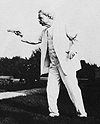
Albert Bigelow Paine
Mark Twain: A Biography
Mark Twain’s second present came at Christmas-time. About ten days earlier, a letter came from Robert J. Collier, saying that he had bought a baby elephant which he intended to present to Mark Twain as a Christmas gift. He added that it would be sent as soon as he could get a car for it, and the loan of a keeper from Barnum & Bailey’s headquarters at Bridgeport.
The news created a disturbance in Stormfield. One could not refuse, discourteously and abruptly, a costly present like that; but it seemed a disaster to accept it. An elephant would require a roomy and warm place, also a variety of attention which Stormfield was not prepared to supply. The telephone was set going and certain timid excuses were offered by the secretary. There was no good place to put an elephant in Stormfield, but Mr. Collier said, quite confidently:
“Oh, put him in the garage.”
“But there’s no heat in the garage.”
“Well, put him in the loggia, then. That’s closed in, isn’t it, for the winter? Plenty of sunlight—just the place for a young elephant.”
“But we play cards in the loggia. We use it for a sort of sun-parlor.”
“But that wouldn’t matter. He’s a kindly, playful little thing. He’ll be just like a kitten. I’ll send the man up to look over the place and tell you just how to take care of him, and I’ll send up several bales of hay in advance. It isn’t a large elephant, you know: just a little one— a regular plaything.”
There was nothing further to be done; only to wait and dread until the Christmas present’s arrival.
A few days before Christmas ten bales of hay arrived and several bushels of carrots. This store of provender aroused no enthusiasm at Stormfield. It would seem there was no escape now.
On Christmas morning Mr. Lounsbury telephoned up that there was a man at the station who said he was an elephant-trainer from Barnum & Bailey’s, sent by Mr. Collier to look at the elephant’s quarters and get him settled when he should arrive. Orders were given to bring the man over. The day of doom was at hand.
But Lounsbury’s detective instinct came once more into play. He had seen a good many elephant-trainers at Bridgeport, and he thought this one had a doubtful look.
“Where is the elephant?” he asked, as they drove along.
“He will arrive at noon.”
“Where are you going to put him?”
“In the loggia.”
“How big is he?”
“About the size of a cow.”
“How long have you been with Barnum and Bailey?”
“Six years.”
“Then you must know some friends of mine” (naming two that had no existence until that moment).
“Oh yes, indeed. I know them well.”
Lounsbury didn’t say any more just then, but he had a feeling that perhaps the dread at Stormfield had grown unnecessarily large. Something told him that this man seemed rather more like a butler, or a valet, than an elephant-trainer. They drove to Stormfield, and the trainer looked over the place. It would do perfectly, he said. He gave a few instructions as to the care of this new household feature, and was driven back to the station to bring it.
Lounsbury came back by and by, bringing the elephant but not the trainer. It didn’t need a trainer. It was a beautiful specimen, with soft, smooth coat and handsome trappings, perfectly quiet, well-behaved and small— suited to the loggia, as Collier had said—for it was only two feet long and beautifully made of cloth and cotton—one of the fairest toy elephants ever seen anywhere.
It was a good joke, such as Mark Twain loved—a carefully prepared, harmless bit of foolery. He wrote Robert Collier, threatening him with all sorts of revenge, declaring that the elephant was devastating Stormfield.
“To send an elephant in a trance, under pretense that it was dead or stuffed!” he said. “The animal came to life, as you knew it would, and began to observe Christmas, and we now have no furniture left and no servants and no visitors, no friends, no photographs, no burglars— nothing but the elephant. Be kind, be merciful, be generous; take him away and send us what is left of the earthquake.”
Collier wrote that he thought it unkind of him to look a gift-elephant in the trunk. And with such chaffing and gaiety the year came to an end.
Wednesday, December 21
The Story of Mark Twain's "Christmas Elephant"
Posted by
Brent M. Colley
at
7:33 AM
0
comments
![]()
Labels: christmas, elephant, Mark Twain, Mark Twain Stormfield
Subscribe to:
Posts (Atom)


